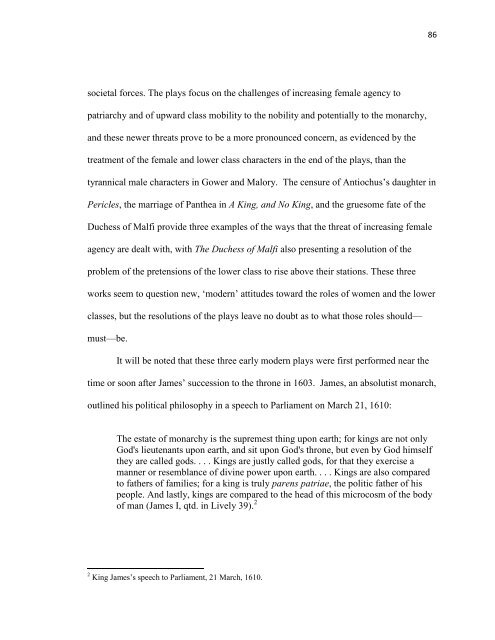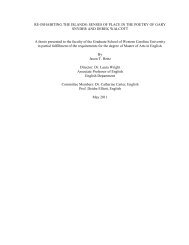SUMMERS, KAREN CRADY, Ph.D. Reading Incest - The University ...
SUMMERS, KAREN CRADY, Ph.D. Reading Incest - The University ...
SUMMERS, KAREN CRADY, Ph.D. Reading Incest - The University ...
Create successful ePaper yourself
Turn your PDF publications into a flip-book with our unique Google optimized e-Paper software.
86<br />
societal forces. <strong>The</strong> plays focus on the challenges of increasing female agency to<br />
patriarchy and of upward class mobility to the nobility and potentially to the monarchy,<br />
and these newer threats prove to be a more pronounced concern, as evidenced by the<br />
treatment of the female and lower class characters in the end of the plays, than the<br />
tyrannical male characters in Gower and Malory. <strong>The</strong> censure of Antiochus’s daughter in<br />
Pericles, the marriage of Panthea in A King, and No King, and the gruesome fate of the<br />
Duchess of Malfi provide three examples of the ways that the threat of increasing female<br />
agency are dealt with, with <strong>The</strong> Duchess of Malfi also presenting a resolution of the<br />
problem of the pretensions of the lower class to rise above their stations. <strong>The</strong>se three<br />
works seem to question new, ‘modern’ attitudes toward the roles of women and the lower<br />
classes, but the resolutions of the plays leave no doubt as to what those roles should—<br />
must—be.<br />
It will be noted that these three early modern plays were first performed near the<br />
time or soon after James’ succession to the throne in 1603. James, an absolutist monarch,<br />
outlined his political philosophy in a speech to Parliament on March 21, 1610:<br />
<strong>The</strong> estate of monarchy is the supremest thing upon earth; for kings are not only<br />
God's lieutenants upon earth, and sit upon God's throne, but even by God himself<br />
they are called gods. . . . Kings are justly called gods, for that they exercise a<br />
manner or resemblance of divine power upon earth. . . . Kings are also compared<br />
to fathers of families; for a king is truly parens patriae, the politic father of his<br />
people. And lastly, kings are compared to the head of this microcosm of the body<br />
of man (James I, qtd. in Lively 39). 2<br />
2 King James’s speech to Parliament, 21 March, 1610.
















